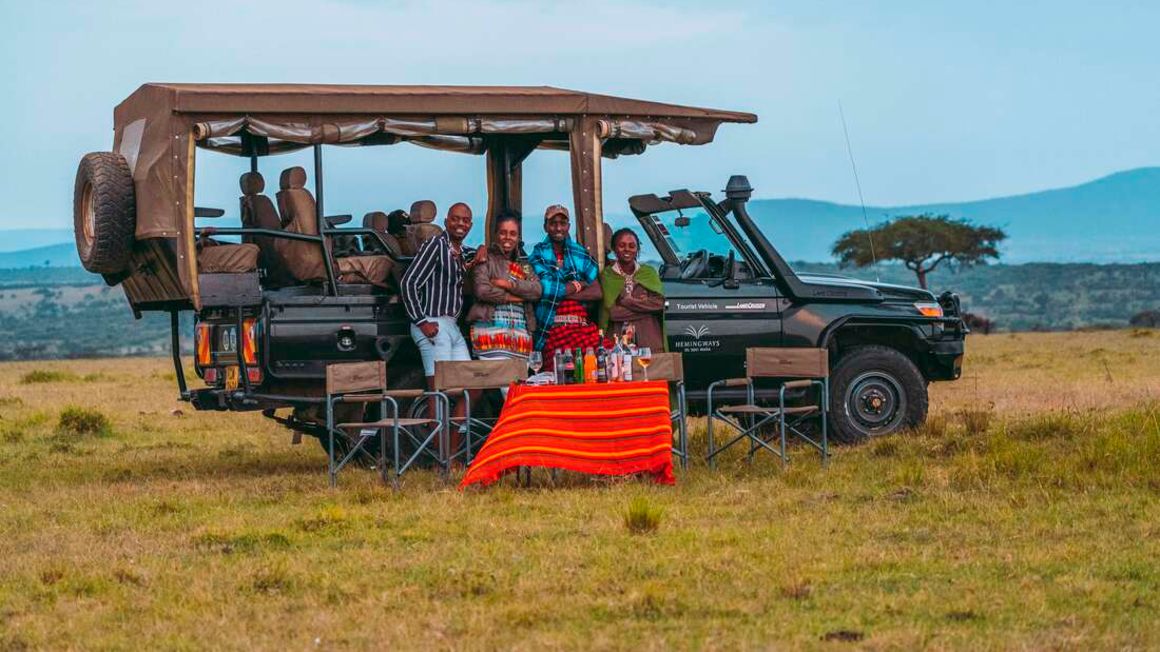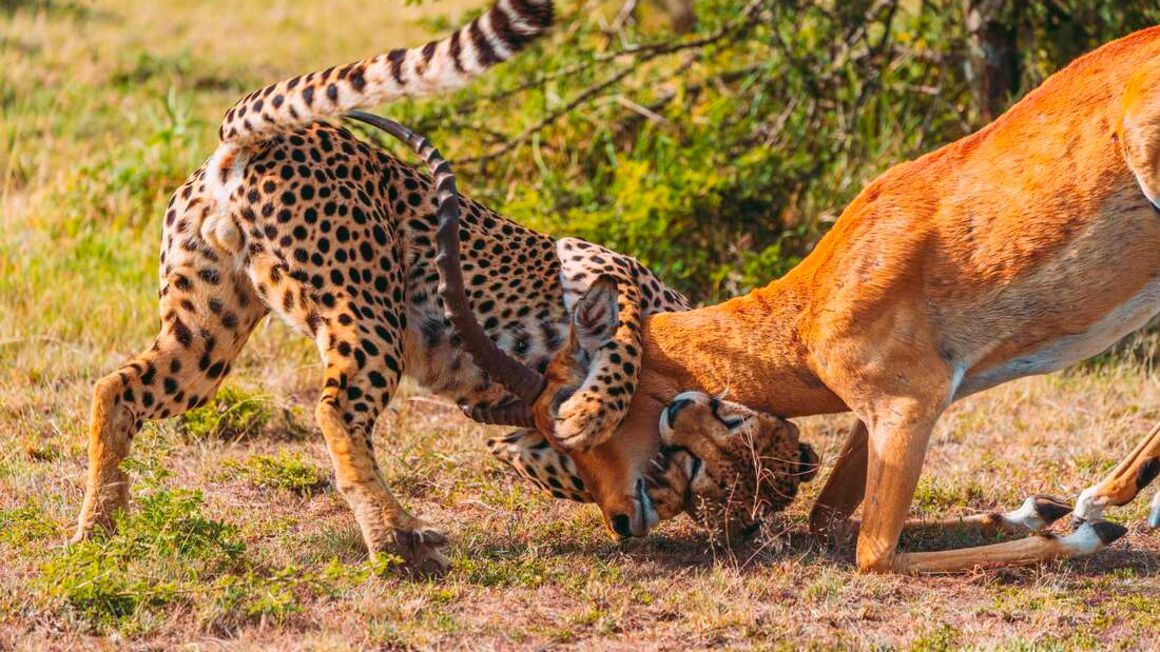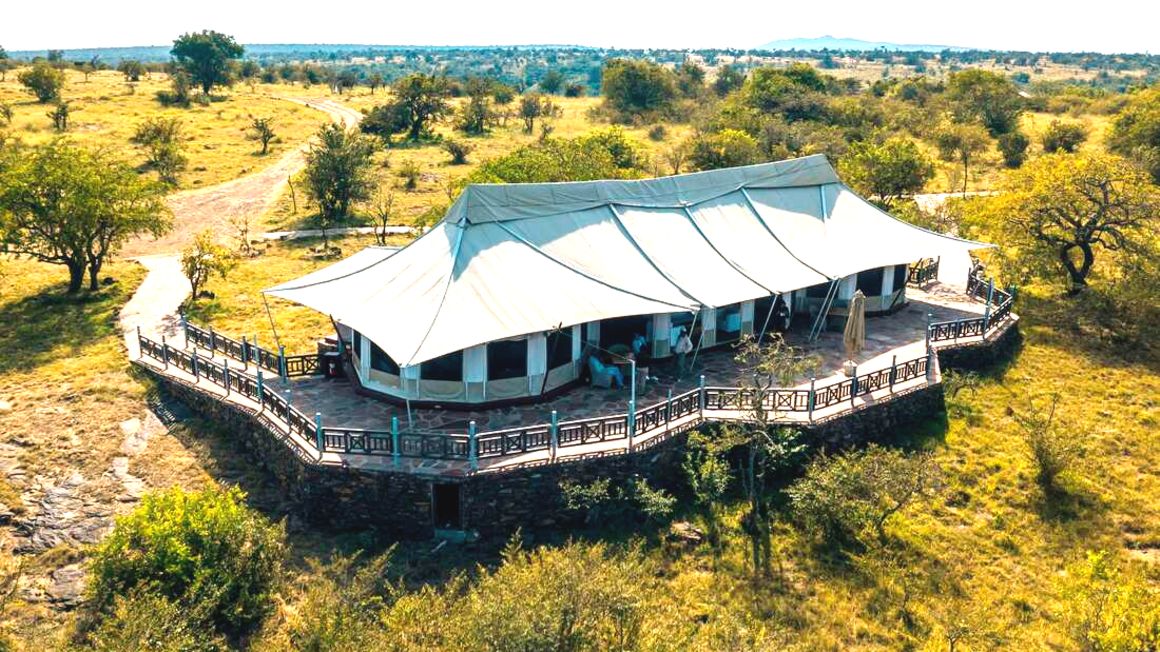I pull a chair in the middle of the wilderness; sip rosé wine while staring at the nothingness of the Maasai Mara horizon. Warthogs, curvaceous zebras, gold and blue-striped jackals, mangy hyenas and male wildebeest run restlessly on the vast fields. It is the start of the mating season, a spectacle worth my time.
It is 5pm and the reddish-orange colours of the sunset playing peekaboo transport me to my happy place. As darkness sets in, roars of the nocturnal animals send my friends and me back to our fenceless tented camp, nestled in a 50,000-acre conservancy, to more night sounds lulling us to sleep.
It is the animal behaviours, the silence of the wild, and the thrill of sleeping in a tent a few metres away from lions or elephants that is drawing Kenyans in droves to Maasai Mara.
When coronavirus closed international borders, Maasai Mara, a destination known to host more than 300,000 foreign tourists a year, was left to only a few hotel staff and thousands of wild animals.
“When last year’s wildebeest migration season reached, we thought it was going to be an extremely quiet time. Our international guests had diminished completely. We were so wrong. Locals flocked to Mara. People from Nairobi were so pleased to get out from the lockdown,” says Debbie Paul, Ol Seki Hemingways Camp manager.
A majority of them took advantage of the reduced park fees and hotel charges. “We came right down to Sh17,000 per night from Sh50,000 for residents. Now the charges are back up,” she says.
Bookings
As this year’s migration watch draws near, hotels in Mara have started receiving bookings again.
“We have bookings already and I’m certain we will have more in coming months. I reckon we will be full with a mix of both locals and international guests,” says Ms Paul.
But while Kenya has a buoyant middle class— evidenced in holidaymakers from Nairobi who witnessed the wildebeest migration for the first time last year—this number only makes up a small percentage of the lodges’ income.
In the battered tourism industry, reliance on the wildebeest migration season is no longer sustainable, forcing camp owners to seek another kind of safari-goer; one who will come in all year round.
“We want guests to come to guided bushwalks as animals roam around, go for village safaris to learn the ways of life of the Maasai, get the thrill of dining in the bush, or enjoy a drink while watching the sunset,” says the manager of the camp that had been receiving bookings a year in advance pre-Covid.
Porini Mara Camp has also seen an increase in bookings, ahead of the migration period. “We are at 42 percent, which is good. Last year, when we’d host one guest, then wait for two weeks to get another. Many are re-bookings from overseas guests who had postponed their trips and Kenyans,” says Jeremiah Chege, product and marketing manager at Gamewatchers and Porini Camps.
David Adiaka, an assistant manager at Ol Seki camp, says there is never a dull moment in the wilderness.
Mr Adiaka who has worked in Mara for over 15 years, starting as a tour guide, and seeing Ol Seki change ownership, first from Sue Allan, then to some Italians, later to Richard Evans, says the profile of guests has also changed, so should the attractions.
“Years ago, most of the guests were old and white. Tourists in their 60s, mostly from the UK and the US. But now we are seeing younger international guests, some travelling solo. We are also seeing more Kenyans. The other day, we received a Palestinian for the first time,” he says.
During the wildebeest migration, he sees hundreds of tourists crowd at the Mara River but says this should not be the only thing worth travelling for.
Over the years, he has seen an abundant game, because of the controlled grazing rules and Sh200 fine per cow imposed on Maasais whose livestock stray.
Now they have over 38 lions at the Mara Naboisho Conservancy which houses Ol Seki and seven other lodges.
“You don’t have to come during the migration or Christmas Day or New Year. There are interesting things to see all year round. For instance, in the last two days, my guests and I have seen two leopards, a teenager, and her mother sharing a Thomson’s gazelle hang up an acacia tree. A very rare sighting because leopards are elusive. We also saw two cheetahs kill prey,” he says.
Noise in the wild
But as the bush hotels court domestic tourists, they are facing new challenges.
In most bush lodges, guests co-exist with wild animals and fun is in the quiet, day and night game drives, and sauntering into the wilderness. But for many Kenyan holidaymakers, fun is in alcohol, meats and noisy parties.
“A lot of younger guests who came last time wanted to drink, party and listen to loud music throughout yet we are in the wilderness. We had some tricky times; them wanting to drink to the wee hours of the morning, not waking up early for the game drives, wanting to eat breakfast past 11 am, and lunch at 4 o’clock,” Ms Paul says.
Such noise can stress wild animals roaming freely in the camps. The difference in culture threw the hotels, which were not used to mass travellers, out of balance.
“All of a sudden, we had a real assortment of different guests. It was tricky because some did not want to follow a routine. We were used to guests who were told, ‘well this is what you are going to do today. Are you happy with it?’ They’d say yes,” she says.
Over time, they have had to reimagine the future with domestic guests. They tweaked the menus and are planning for renovations to accommodate future guests.
Previously, small boutique hotels served continental cuisine, common foods eaten in Europe. Yet some Kenyan bush travellers want barbecued goat meat daily. Others want Indian cuisine only.
The table d’hôte menu in intimate lodges is different from buffets or à la carte served in jam-packed hotels, especially at the Coast.
“Here, we get about 20 people when fully booked. We usually have one set menu, a three-course meal for lunch and four-course for the evening,” Ms Paul says, adding that they had to create more menus.
Pre-Covid, high-end lodges in Maasai Mara had also become an escape for honeymooners.
“We have many honeymooners who come for two to four nights. On one night, we sneak them out to a cave lit beautifully, with a fireplace and a romantic dinner served under a rock. They can hear the lions and hyenas echoing under the valley,” says Ms Paul.
But many locals travel with young children or teenagers, who can be a disruption to honeymooners.
“We are accepting families which we did not do before. We built two family tents, with a connecting twin bedroom. Children are full of life and noise, and they love to splash in the swimming pool. But if we have honeymooners, they’d want their quiet. So we may have to add another pool near the family tents,” says Ms Paul, who has managed over six intimate hotels in Tsavo, Lamu and Maasai Mara.
Running bush lodges is not everybody’s cup of tea. How does she get to work in the bush for years on end?
“I am not a city person. I love listening to the beautiful noise of the wild. When I get to Nairobi, all the smoke, people, traffic, telephones…can make my head burst,” she says, adding that she paints, plays the ukulele in her free time and is now doing a course on reflexology.
Mr Adiaka adds that locals also tend to go for fewer game drives.
“Someone wonders ‘how many times will I see the animals?’ But every game drive is different. I have been to countless and every time I’m thrilled,” he says.
His most memorable time in the wild?
“Four lionesses and one lion ran so fast in the open field, then they suddenly stopped and lay down, playing dead. The wildebeests came close, perhaps to witness the death of their enemies. They were eaten mercilessly,” he says.
He can never forget the leopard mating ritual.
“It is rare to see because the cats are very shy. We watched them mate for a few minutes, climb up a tree, climb down and get back to it, they did this for a long time,” he says.
Credit: Source link


